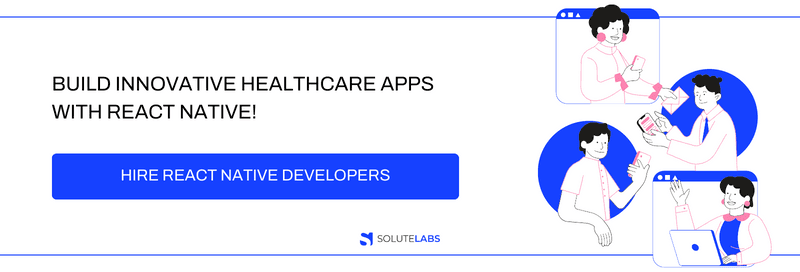Imagine apps that can improve your health experience, and now picture creating them to be both smart and user-friendly. If you're someone who cares about healthcare or is curious about how apps can enhance it, you're in the right place.
In this blog, we're going to explore a fascinating concept called React Native. It's like a superpower that developers use to create apps. But what's even more exciting is how it's teaming up with healthcare apps to change the game. We'll take you through why React Native is becoming the preferred choice for building healthcare apps. Don't worry if you're not a tech expert – we'll explain it in a way that's easy to grasp.
So, if you're ready to explore why React Native is making healthcare apps smarter and more user-friendly, stick around. We're about to show you how this powerful combination is making a significant difference in the world of health and technology.
Why Opt for React Native in Healthcare App Development?
React Native is proving to be a game-changer when it comes to building healthcare apps. Here are some detailed reasons why you should consider choosing React Native for your healthcare app development:
Cross-Platform Compatibility:
React Native allows you to create a single codebase that works on both iOS and Android platforms. This is particularly advantageous for healthcare apps as it saves time and resources. Instead of developing separate apps for each platform, you can focus on building one app that functions seamlessly on both.
Cost-Effectiveness:
Developing and maintaining separate apps for iOS and Android can be costly. React Native's cross-platform approach significantly reduces development costs, making it an attractive option, especially for healthcare startups or organizations working on a budget.
Faster Development:
React Native's "hot-reloading" feature allows developers to instantly see the changes they make to the app, speeding up the development process. This is crucial for healthcare apps that might need quick updates or modifications to stay current with medical advancements or patient needs.
Reusable Components:
React Native uses a modular approach with reusable components. This means that components created for one part of the app can easily be used in other parts, saving development time and ensuring consistency throughout the app.
Third-Party Plugins and Libraries:
The React Native community is vibrant and active, resulting in a plethora of third-party plugins and libraries. For healthcare apps, this means easy integration of features like real-time chat, secure data storage, patient data encryption, and more.
User Experience:
React Native's ability to render components natively gives healthcare apps a native look and feel, enhancing the user experience. This is crucial for healthcare apps, where clear and intuitive interfaces can make a significant difference in patient engagement.
Performance:
React Native offers a good performance by allowing developers to write native modules in languages like Java, Objective-C, or Swift. This is particularly beneficial for healthcare apps that may involve complex calculations, real-time monitoring, or image processing.
Streamlined Maintenance:
Utilizing a unified codebase for both platforms simplifies the process of maintaining and updating the application. This is essential for healthcare apps that may require regular updates to include new medical guidelines, treatment protocols, or patient engagement features.
Rapid Prototyping:
Healthcare is an ever-evolving field, and rapid prototyping is essential to test new ideas quickly. React Native's quick development cycle allows healthcare professionals and developers to collaborate closely, leading to more effective and relevant app solutions.
Scalability:
As your healthcare app gains traction and a user base, you need a technology that scales smoothly. React Native, being backed by Facebook, is designed to handle large-scale apps, ensuring your healthcare app can grow with the demand.
Security:
Security is paramount in healthcare apps, considering they deal with sensitive patient data. React Native provides options for integrating encryption and secure communication protocols, ensuring the confidentiality of patient information.
Integration with Existing Systems:
Many healthcare organizations already have legacy systems in place. React Native can seamlessly integrate with existing apps and systems, enabling a smoother transition to modern app-based solutions.
Features of React Native Healthcare Apps
React Native offers a host of features that make it an ideal choice for developing healthcare apps. Here are some key features that stand out when creating healthcare apps using React Native:
Native-Like Performance:
React Native uses native components to render the user interface. This means that the app feels and performs like a native app, providing a smooth and responsive user experience. This is crucial for healthcare apps that demand real-time interactions and quick data processing.
Modular Components:
React Native encourages a modular approach to development. This allows developers to create reusable components, saving time and effort in building and maintaining the app. In healthcare apps, this modularity facilitates the integration of complex features such as appointment scheduling, prescription management, and patient profiles.
Third-Party Plugin Integration:
The React Native community has developed a wide range of third-party plugins and libraries that can be seamlessly integrated into healthcare apps. These plugins cover areas such as authentication, data encryption, communication tools, and patient data storage, enhancing the functionality of the app.
Hot Reloading:
Hot reloading is a feature that allows developers to see the changes they make to the app in real-time, without the need to rebuild the entire app. This accelerates the development process, making it easier to iterate and refine the app's features, which is essential for healthcare apps that require frequent updates.
UI Customization:
Healthcare apps often require specific and unique user interfaces. React Native provides the flexibility to customize the UI according to the healthcare app's branding and user experience requirements.
Offline Support:
Healthcare apps may need to function in environments with limited or no internet connectivity. React Native supports offline access, allowing users to interact with certain parts of the app even when they are offline, ensuring continuity of care.
Push Notifications:
Keeping patients informed about appointments, medication reminders, and health tips is crucial for healthcare apps. React Native simplifies push notification integration, enabling healthcare providers to maintain better communication with their patients.
Ensuring Data Security:
Healthcare apps handle sensitive patient information. React Native provides options to integrate security measures such as encryption, secure communication protocols, and user authentication, ensuring patient data remains protected.
Integration with Native Modules:
For healthcare apps that require specialized functionality, React Native allows the integration of native modules written in languages like Java, Objective-C, or Swift. This opens the door to incorporating device-specific features seamlessly.
Suggested Read
Why Use React Native For Enterprise Mobile App Development?
View Blog
Future Trends of React Native in Healthcare Apps
As we peer into the crystal ball of technological innovation, several trends emerge that showcase the remarkable potential of React Native in shaping the future of healthcare apps.
1. IoT Integration:
The Internet of Things (IoT) is heralding a new era of interconnected devices, and its fusion with healthcare apps holds immense promise. React Native's adaptability and cross-platform compatibility position it as a prime candidate for integrating IoT devices into healthcare apps. From wearable health trackers to smart medical equipment, React Native's capabilities enable developers to seamlessly connect and control IoT devices, enhancing patient monitoring, data collection, and treatment adherence.
2. Adoption of AI and ML:
Artificial Intelligence (AI) and Machine Learning (ML) are revolutionizing healthcare diagnosis, treatment, and patient care. React Native's future lies in supporting the integration of AI-driven features into healthcare apps. From symptom prediction to personalized treatment recommendations, React Native's modularity and native performance will facilitate the incorporation of AI and ML algorithms, making healthcare apps smarter and more responsive.
3. Remote Patient Monitoring:
Telemedicine and remote patient monitoring are becoming integral to modern healthcare delivery. React Native's real-time capabilities, along with its ability to leverage device functionalities, will drive the creation of sophisticated remote patient monitoring apps. These apps can enable patients to track vital signs, manage chronic conditions, and communicate with healthcare professionals seamlessly, bridging the gap between patients and providers.
4. Different Cloud Services:
Cloud services have become the backbone of digital healthcare solutions, providing secure storage and accessibility to patient data. React Native's compatibility with various cloud service providers will continue to enhance the integration of cloud-based features in healthcare apps. This includes features like storing medical records securely, synchronizing patient data across devices, and facilitating collaborative care among healthcare teams.
As React Native evolves in tandem with these trends, the healthcare industry can anticipate a paradigm shift in patient care and engagement. From the seamless integration of IoT devices to the implementation of advanced AI-powered diagnostics, React Native will empower developers to create apps that not only streamline healthcare processes but also improve patient outcomes and experiences. The future of healthcare apps is dynamic and patient-centric, and React Native is poised to play a pivotal role in making this vision a reality.
Suggested Read
Hire React Native Developers - A Quick Guide
View Blog
Conclusion
In the evolving world where healthcare and technology meet, React Native emerges as a guiding light of innovation and progress. This powerful framework, with its cross-platform compatibility, native-like performance, and modular development approach, has proven itself as an ideal solution for crafting cutting-edge healthcare apps. As we've explored the future trends, it's clear that React Native is not just a tool but a catalyst for revolutionizing patient care, remote monitoring, and the integration of AI and IoT. The potential it holds for healthcare app development is boundless, promising an era of smarter, more efficient, and patient-centric healthcare solutions.
At the heart of this journey lies the expertise of SoluteLabs, your partner in harnessing the power of React Native for healthcare app development. Our dedicated team of developers, armed with a deep understanding of both healthcare and technology, is committed to bringing your visionary healthcare app to life. Whether it's telemedicine solutions, patient engagement platforms, or remote monitoring applications, we combine React Native's prowess with industry insights to create solutions that resonate with patients and providers alike.
Ready to Shape the Future of Healthcare Apps?
Empower your healthcare initiatives with SoluteLabs' expertise in React Native App development. Whether you're a healthcare professional, a startup, or an established healthcare institution, we're here to craft apps that transcend expectations and make a real impact on patient care.
Visit SoluteLabs today and discover how we can transform your healthcare app vision into reality. Let's build a healthier, smarter future together.
Take the First Step - Contact Us Now!








